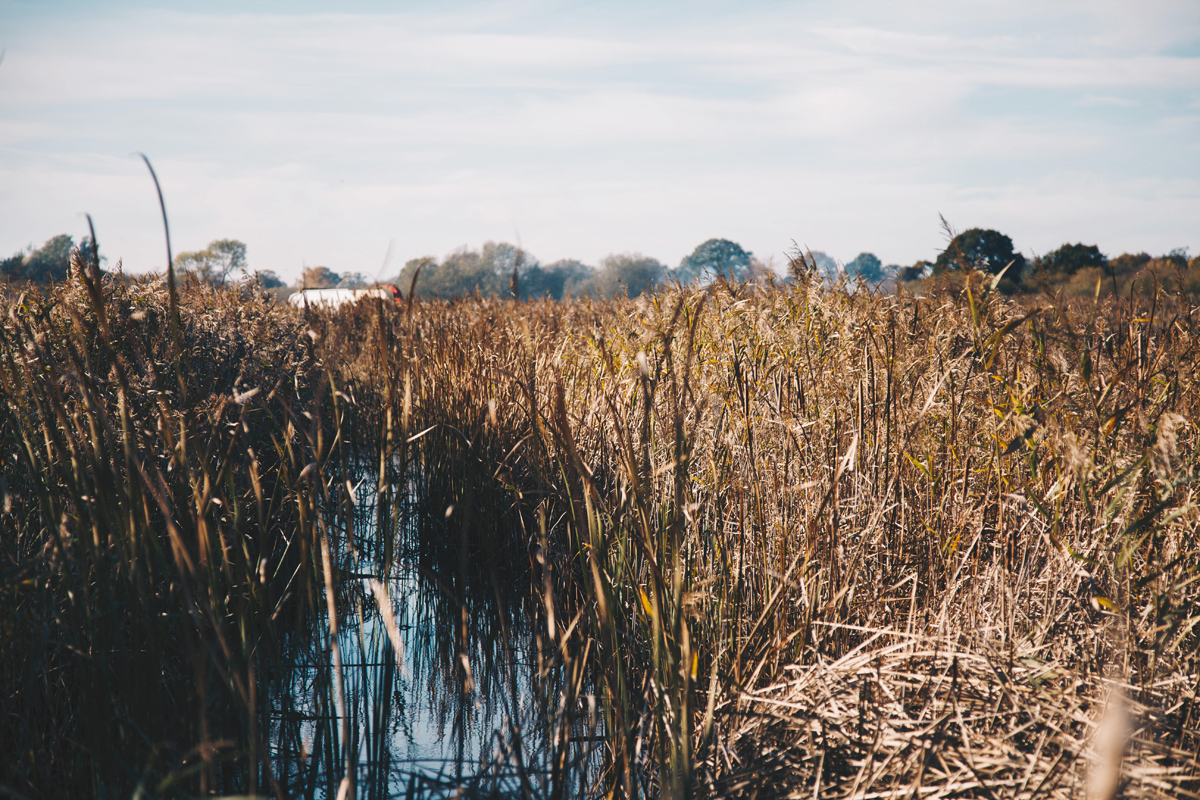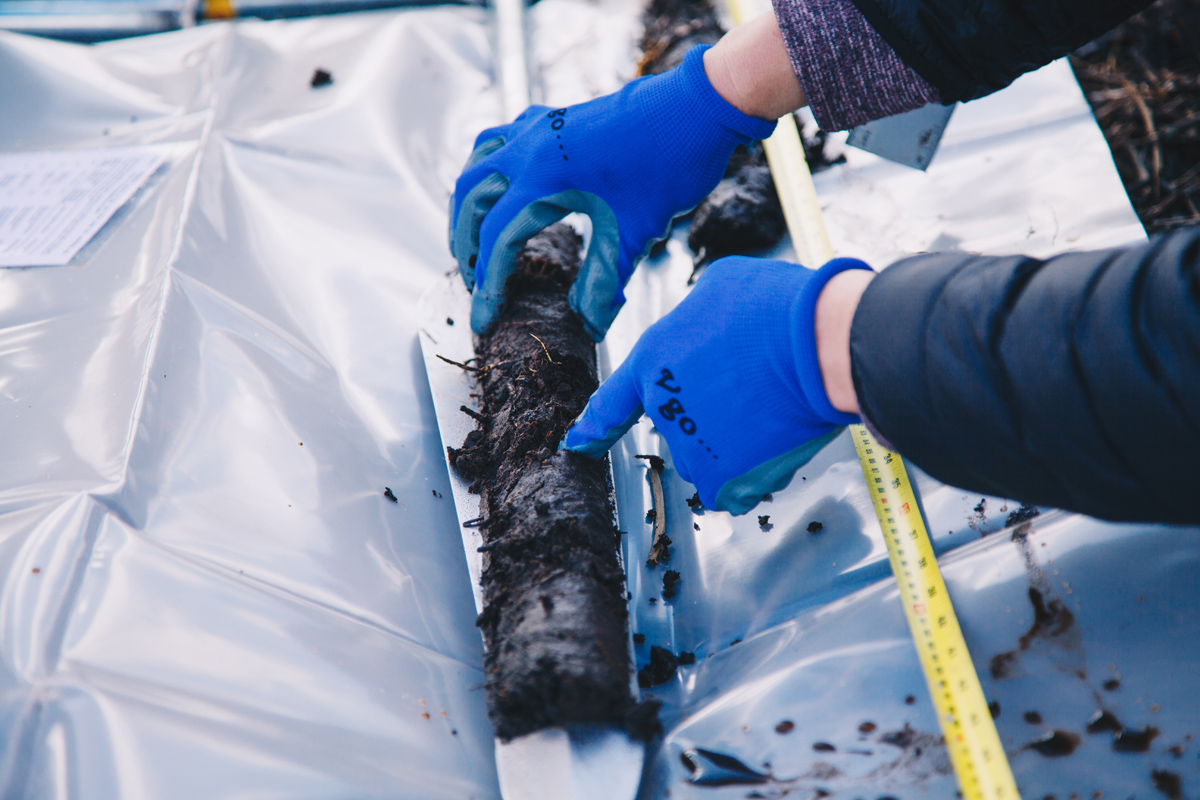Broads Peat Discovery Project
While the Broads National Park stores vast amounts of carbon, locked up in its wet fen and peatlands, nearly a quarter of its deep peat soils are drained for agriculture, which releases greenhouse gases.

In fact, around one million tonnes of carbon have been lost from the Broads in the past 40 years. With the Broads Peat Discovery Project and its partnership, we have helped some farmers and land managers tackle the barriers to peatland restoration.
In 2022 and 2023, the Broads Peat Discovery Project undertook investigations over 15 sites in each river valley of the Broads. The aim is to enable peatland restoration on suitable sites, as healthy peatlands provide remarkable services to society: carbon store, water filtration, flood prevention, habitats for wildlife, historic landscape. This approach also aims to create new income streams for farmers and landowners seeking to reduce their emissions, improve the quality of their land and support biodiversity.
Every 10 centimetres of reduction in water table depth could reduce the net warming impact of CO2 and CH4 emissions by the equivalent of at least three tonnes of CO2 per hectare per year.
The barriers to peat restoration include:
- Finance (how to finance the investment required to restore existing peatlands, and the options for long term change for the land to create viable new peatlands)
- Policy (including permissions for water supply and management)
- Product development (to generate income from crops growing on peatlands, including innovation support, groups/networks, standards and trade bodies)
- Farmers engagement (because the willingness of famers is critical, engagement activities cover providing technical advice on keeping peat soils wetter, sharing data about their land, training, legal advice, networking with stakeholders involved in product development and machinery)
The partnership included Palladium, Norfolk Wildlife Trust, Suffolk Wildlife Trust, Natural England, RSPB, National Trust, Norfolk FWAG, and various private landowners. A wider network of stakeholders supported the project with the Water Management Alliance, NFU, Cranfield University and the Environment Agency.
Deliverables and outcomes

A key outcome from the Peat project is the collection and collation of considerable data from a wide range of sites located within different river valleys in the Broads: the River Chet, Waveney, Bure, Ant and Thurne. The data collected included soil surveys, peat surveys, water levels, vegetation and water vole surveys, as well as undertaking assessments to gain a better understanding of the historic environment relevant to each site. The data was shared with the relevant farmer or land manager for the respective site.
Using the data, we have created restoration plans for 8 sites and submitted an application for a restoration grant for one site at this stage.
Under the National Park Revere initiative, Palladium has developed the first carbon finance model in the UK for lowland peat. This has been applied to each of the sites that progressed to the restoration plan stage to enable the landowners to understand how their sites could generate carbon credits should the right environmental and political conditions prevail.
Thanks to the Discovery Project, a new approach to assessing water vole habitats has been developed, in collaboration with Natural England and UK specialists in this field. The new approach enables a more resource efficient way to produce water vole assessments over large site areas at the feasibility stage of a project. A paper was presented to the Mammal Society Annual Conference at the beginning of August 2023 to share the knowledge with other professionals interested in this area of research.
Cranfield University undertook the first landscape wide water table and greenhouse gas emission assessment, producing. a map to illustrate combined emissions of CO2 and CH4 from peat soils based on a field by field assessment of drainage levels in the Broads Executive area.
Regarding wider engagement of the community, we made over 1000 face to face interactions with third parties, and engaged with the media, such as Farming Today!. We worked with a number of schools to increase the students’ awareness of peat, attended a variety of events, including the Royal Norfolk Show. With the help of Norfolk Farming Advisory Group, we hosted three farm walks open to farmers and landowners to highlight new ideas related to peat soils and agricultural business practices, and long-standing ideas (especially if you are a reedgrower/reedcutter) on wet farming, also known as Paludiculture.
With the increased knowledge acquired throughout the Broads Peat Discovery Project, we will continue to raise awareness about peat within our community, and how we can create conditions to rebuild and restore it, and, just as importantly, to prevent its degradation. We aim to overcome barriers, with the long-term objective of peatland restoration where it is achievable.
Nature for Climate Peatland Grant Scheme - Discovery Grant funding
The Broads Peat Project was funded by the Nature for Climate Peatland Grant Scheme (DEFRA), administered by Natural England (£1,125,800 from December 2021 until August 2023). The scheme provides funding to restore peatlands in the uplands and lowlands of England.
Further information
You can contact Andrea Kelly, Environment Policy Adviser on Andrea.Kelly@broads-authority.gov.uk

